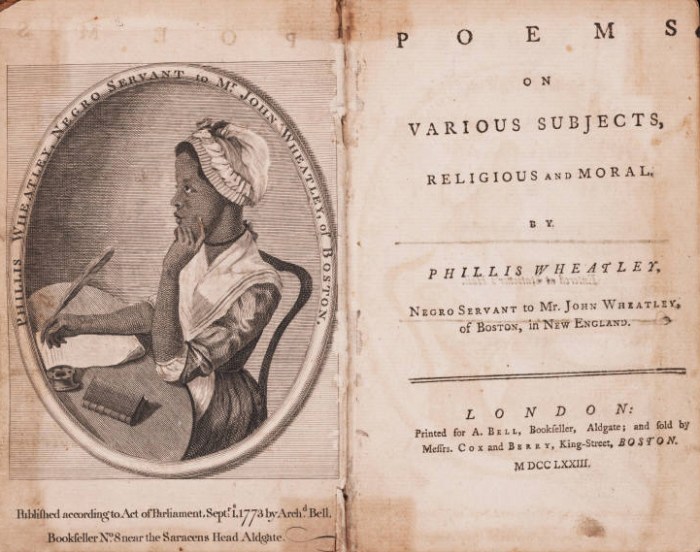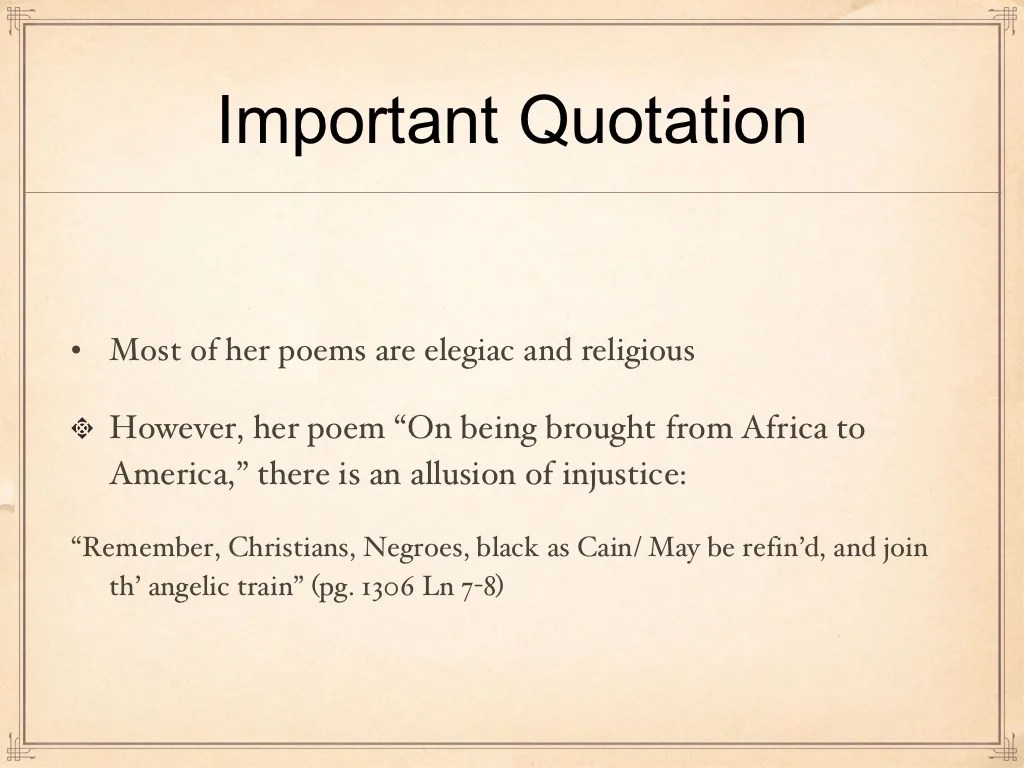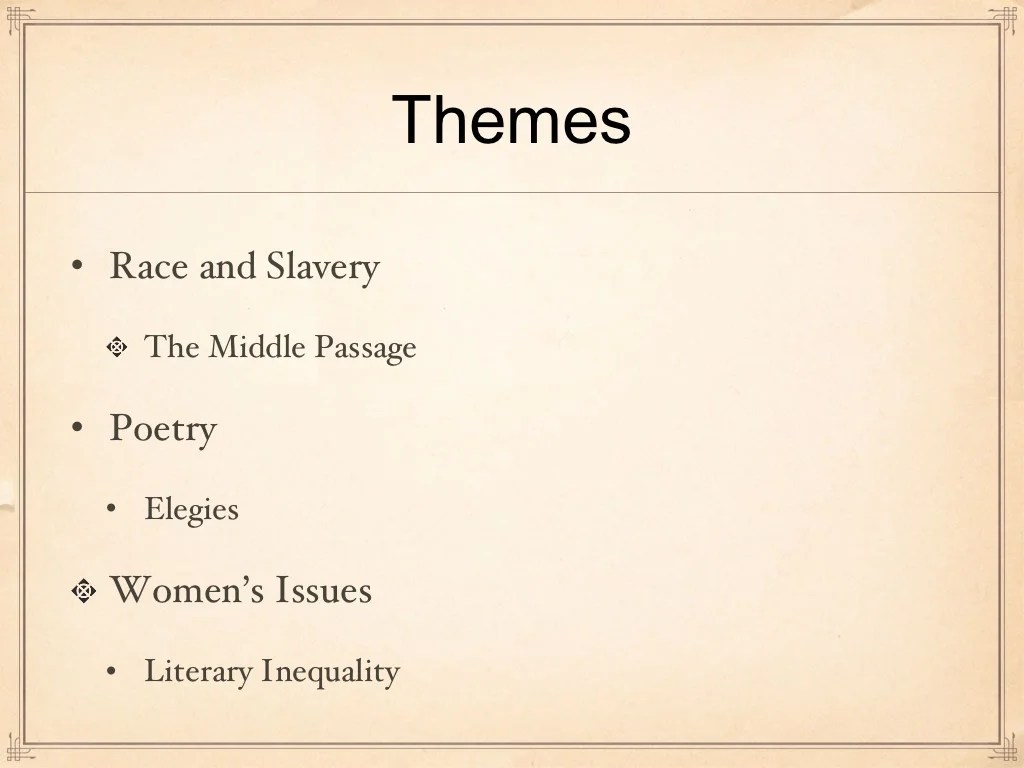To maecenas phillis wheatley analysis – In the realm of American literature, Phillis Wheatley’s “To Maecenas” stands as a testament to her extraordinary talent and the complexities of her time. This analysis delves into the historical context, literary devices, themes, and rhetorical strategies employed in this powerful poem, revealing its profound impact on American culture and beyond.
Wheatley’s words, crafted during the tumultuous era of slavery, resonate with a poignant exploration of race, gender, and the search for patronage in a society marked by inequality.
Historical Context

Phillis Wheatley’s life and work unfolded amidst the tumultuous backdrop of the American Revolution. As an enslaved African woman in the 18th century, she navigated a complex and oppressive social hierarchy that profoundly shaped her experiences and writing.
The social and cultural norms of the time dictated that African Americans were considered inferior and denied basic rights and freedoms. Wheatley’s status as a slave subjected her to harsh treatment, limited opportunities, and the constant threat of separation from her loved ones.
Despite these challenges, Wheatley’s keen intellect and unwavering determination allowed her to emerge as a prominent literary figure. Her ability to write poetry in the classical tradition, a skill typically reserved for the privileged elite, challenged prevailing notions of racial inferiority and demonstrated the intellectual capabilities of enslaved individuals.
Literary Analysis

In “To Maecenas,” Wheatley employs a variety of literary devices and techniques to convey her message. The poem is written in iambic pentameter, a traditional poetic form that lends a sense of formality and sophistication to her writing.
Wheatley also uses rhyme and repetition to create a musicality and memorability in her verses. The poem’s rhyme scheme, ABAB CDCD EFEF GG, follows a consistent pattern that enhances its rhythmic flow.
Imagery plays a vital role in “To Maecenas.” Wheatley uses vivid descriptions of nature, particularly the natural beauty of her surroundings, to evoke a sense of wonder and awe. These images serve as a contrast to the harsh realities of slavery and provide a glimpse into her inner world.
Themes and Motifs: To Maecenas Phillis Wheatley Analysis
Central to “To Maecenas” are themes of freedom and equality. Wheatley expresses a longing for personal liberty and the recognition of her humanity, despite the oppressive conditions under which she lived.
Another prominent motif is that of patronage. Wheatley addresses her poem to Maecenas, a wealthy Roman patron of the arts, seeking his support and recognition. This reflects the tradition of patronage in classical literature and highlights Wheatley’s desire for validation and support from the established literary community.
Wheatley also explores themes of race and identity. As an African woman in a society that marginalized her, she grapples with her place in the world and the complexities of her own identity.
Rhetorical Strategies

Wheatley employs a range of rhetorical strategies to convey her message in “To Maecenas.” She uses appeals to emotion, logic, and authority to persuade her readers of the justice of her cause.
Pathos, or appeals to emotion, are evident in Wheatley’s vivid descriptions of the hardships faced by enslaved individuals. By evoking empathy and compassion, she seeks to sway her readers to her side.
Wheatley also uses logos, or appeals to logic, by presenting a reasoned argument for her freedom. She cites historical examples and draws parallels to classical literature to support her claims.
Finally, Wheatley employs ethos, or appeals to authority, by invoking the names of respected figures from classical history. By associating herself with these individuals, she lends credibility to her arguments and establishes herself as a worthy recipient of patronage.
Comparisons and Contrasts
“To Maecenas” can be compared to Wheatley’s other works, such as “On Being Brought from Africa to America” and “An Hymn to the Morning.” These poems share similar themes of freedom, equality, and the resilience of the human spirit.
However, “To Maecenas” stands out for its direct and personal appeal to a specific individual. By addressing her poem to a real person, Wheatley creates a sense of intimacy and urgency that is not present in her other works.
In comparison to other poems of the period, “To Maecenas” is notable for its use of classical forms and allusions. Wheatley’s mastery of these techniques demonstrates her exceptional literary skills and her deep knowledge of Western literature.
Legacy and Impact
“To Maecenas” has had a lasting impact on American literature and culture. It is considered one of the most important poems written by an African American during the 18th century and has been widely anthologized and studied.
Wheatley’s work has inspired generations of writers, including contemporary poets such as Maya Angelou and Nikki Giovanni. Her ability to articulate the experiences and aspirations of enslaved individuals has made her a powerful voice for social justice and equality.
“To Maecenas” remains a testament to the resilience and determination of the human spirit. Wheatley’s words continue to resonate with readers today, reminding us of the importance of fighting for freedom and equality for all.
General Inquiries
What is the significance of Phillis Wheatley’s “To Maecenas”?
As one of the first published poems by an enslaved African American woman, “To Maecenas” challenged societal norms and showcased Wheatley’s exceptional literary abilities.
How does Wheatley use literary devices in “To Maecenas”?
Wheatley employs metaphors, similes, and allusions to classical literature to convey her themes and evoke a sense of empathy in her readers.
What are the central themes explored in “To Maecenas”?
The poem explores themes of racial inequality, the desire for recognition, and the search for patronage in a society marked by slavery.

